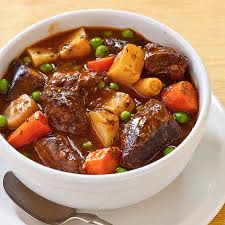stew
英 [stjuː]
美 [stuː]
- vt. 炖,炖汤;焖;忧虑;受闷热
- n. 炖,炖汤;烦恼;闷热;鱼塘
- vi. 炖,炖汤;焖;受闷热;忧虑
- n. (Stew)人名;(英)斯图
使用频率:

记忆方法
1. 谐音“死炖”。
2. stove => stew.
3. It originally denoted 'take a steam bath'.
4. probably from ex- "out" + *tufus "vapor, steam," from Greek typhos "smoke, steam". => stifle, stove, typhoid, typhus.
5. 区别:strew, stew: 有花儿是播撒,因为只有播撒了种子才会开花发芽,没花儿是炖煮。
6. w-v stove小炉子,炉灶-stew
2. stove => stew.
3. It originally denoted 'take a steam bath'.
4. probably from ex- "out" + *tufus "vapor, steam," from Greek typhos "smoke, steam". => stifle, stove, typhoid, typhus.
5. 区别:strew, stew: 有花儿是播撒,因为只有播撒了种子才会开花发芽,没花儿是炖煮。
6. w-v stove小炉子,炉灶-stew
中文词源
stew 炖,煨
来自古法语 estuver,洗热水澡,泡澡,来自 estuve,蒸汽浴室,来自 Proto-Germanic*stubo,加热 的房间,起居室,词源同 stove.后由泡澡引申词义炖,煨。
英语词源
- stew
-
stew: [14] The cooking sense of stew is a secondary development, first recorded in English in the 15th century. It originally denoted ‘take a steam bath’. It came via Old French estuver from Vulgar Latin *extūfāre. This was a compound verb formed from a probable noun *tūfus ‘hot vapour, steam’, a descendant of Greek túphos ‘smoke, steam, stupor’ (source also of English typhus [18] and typhoid [18]). *Extūfāre probably lies behind English stifle too.
=> stifle, stove, typhoid, typhus - stew (v.)
- late 14c., transitive "to bathe (a person or a body part) in a steam bath," from Old French estuver "have a hot bath, plunge into a bath; stew" (Modern French étuver), of uncertain origin. Common Romanic (cognates: Spanish estufar, Italian stufare), possibly from Vulgar Latin *extufare "evaporate," from ex- "out" + *tufus "vapor, steam," from Greek typhos "smoke." Compare Old English stuf-bæþ "hot-air bath;" see stove.
Intransitive use from 1590s. Meaning "to boil slowly, to cook meat by simmering it in liquid" is attested from early 15c. The meaning "to be left to the consequences of one's actions" is from 1650s, especially in figurative expression to stew in one's own juices. Related: Stewed; stewing. Slang stewed "drunk" first attested 1737. - stew (n.)
- c. 1300, "vessel for cooking," from stew (v.). Later "heated room," especially for bathing (late 14c.). The meaning "stewed meat with vegetables" is first recorded 1756. The obsolete slang meaning "brothel" (mid-14c., usually plural, stews) is from a parallel sense of "public bath house" (mid-14c.), carried over from Old French estuve "bath, bath house; bawdy house," reflecting the reputation of medieval bath houses.
权威例句
- 1. He's been in a stew since early this morning.
- 他从今天一大早就焦虑不安。
- 2. Stew the apple and blackberries to make a thick pulp.
- 将苹果和黑莓炖成稠浆。
- 3. The rice is accompanied by a soup or a soupy stew.
- 米饭伴以汤羹或炖菜。
- 4. Rabbit stew is one of chef Giancarlo Moeri's signature dishes.
- 炖野兔是厨师詹卡洛·莫里的招牌菜之一。
- 5. He took a spoonful of the stew and ate it.
- 他舀了一匙炖菜吃了。
